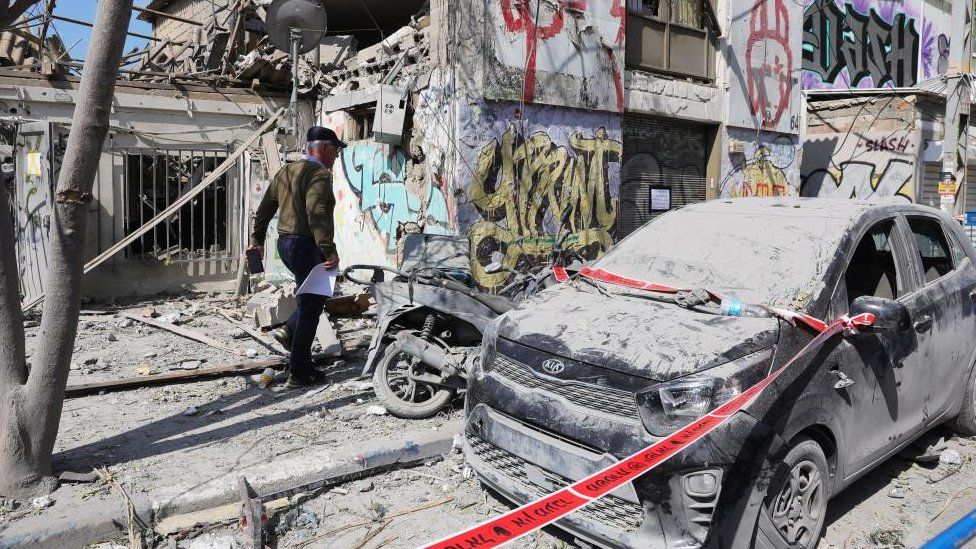
Hamas’s deadly attacks on Israel at the weekend killed 1,200 people
The UK is arranging flights to get stranded British nationals out of Israel, the Foreign Office has said.
The first plane will leave Tel Aviv on Thursday, with more planned “in the coming days, subject to security”.
Those eligible to leave will be contacted directly and British nationals should not go to airports unless they are called to.
A team of UK diplomats trained to operate in crises has also been sent to Israel to assist British nationals.
The UK government said earlier this week it would not arrange evacuation flights because commercial routes were still available.
But British Airways, Virgin Atlantic, EasyJet, Ryanair, Wizz Air, Air France, Lufthansa and Emirates have all suspended flights in recent days.
The government-arranged flights will be chartered by the Foreign Office but are commercial services. Each passenger will be charged £300.
A statement said British nationals, including dual nationals, and dependants if travelling with a British national normally resident in the UK, would be invited to take up seats.
All seats for the first flight have been allocated, a British official at Tel Aviv’s Ben Gurion Airport told the BBC.
Those who will be travelling on the flight have been notified by text message.
More on Israel Gaza war
A number of countries have already completed flights to get people home from Israel, including Canada, France, Italy and Poland.
Most airlines stopped flying direct between Israel and the UK earlier this week, and Virgin Atlantic and British Airways pulled their last remaining daily service on Thursday after a BA flight was forced to turn back over security concerns.
It has left people struggling to find tickets for the few remaining commercial routes operating.
Prior to the government’s announcement, Shaya from Greater Manchester – who did not want to give his surname – told BBC News about the arduous journey his sister Esther, her husband and their nine children were facing because of cancellations.
He said they had visited Israel for a public holiday but had not been able to get a flight home to the UK.
“My family have been living through the terror of air raid sirens going off all around them and now they can’t get on a commercial flight back.
“Tel-Aviv airport is chaos – there are constant air raid sirens and families are queuing for four or five hours to get through check-in.”
After having two flights cancelled in two days, Esther and her family faced having to travel via Dubai and Amsterdam to get back to Manchester – a journey that would take a full day and night.
Shaya said his brother had also travelled to Israel for the holiday and “eventually got a flight back to Birmingham – but their journey took 40 hours”.
Watch: Lyse Doucet moves to safety during live Israel report
The Foreign Office confirmed on Thursday that families of British diplomats were leaving Israel as a “precautionary measure”.
It stressed the embassy in Israel continued to operate, and British nationals could seek consular assistance.
A spokesperson for the Foreign Office said: “The FCDO continues to advise against all travel to parts of Israel and the Occupied Palestinian Territories, and to advise against all but essential travel to all other parts.”
At least 100 “reservists and active duty soldiers” are understood to have travelled from the UK to Israel to serve in the Israel Defence Forces, the Israeli embassy in the UK said.
The Israeli government has indicated it is preparing to launch a ground military operation inside Gaza in response to Hamas’s deadly attacks at the weekend that have left 1,300 dead.
Authorities say more than 1,300 have also been killed in Gaza since Israel launched retaliatory air strikes, with 338,000 displaced.
In a call with Egypt’s President Abdel Fattah el-Sisi, Prime Minister Rishi Sunak called for the country to keep its crossing with Gaza open for “humanitarian and consular reasons”, Downing Street said.
Are you trying to leave Israel for the UK? Are you boarding the flight this evening? You can get in touch by emailing haveyoursay@bbc.co.uk.
Please include a contact number if you are willing to speak to a BBC journalist. You can also get in touch in the following ways:
If you are reading this page and can’t see the form you will need to visit the mobile version of the BBC website to submit your question or comment or you can email us at HaveYourSay@bbc.co.uk. Please include your name, age and location with any submission.








